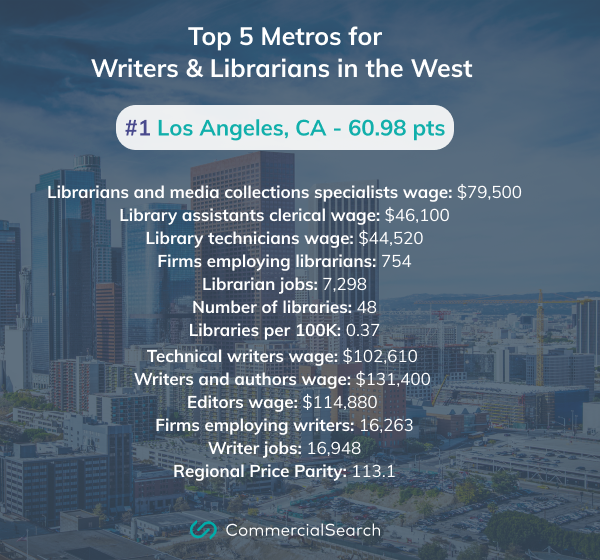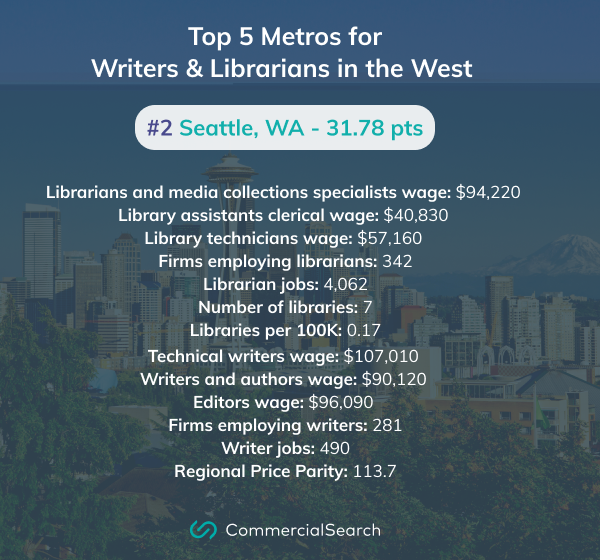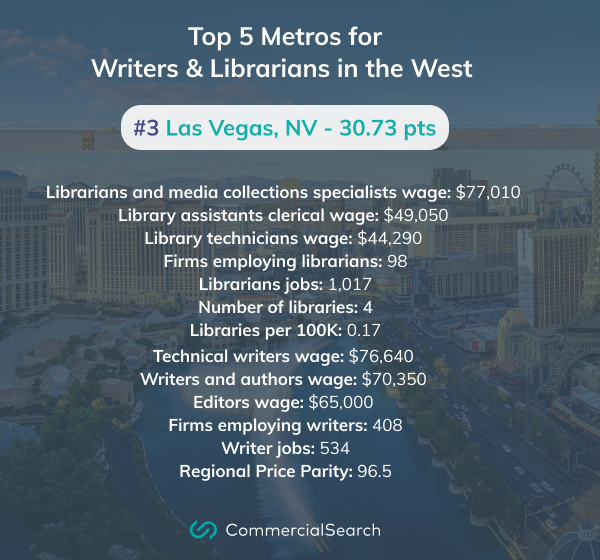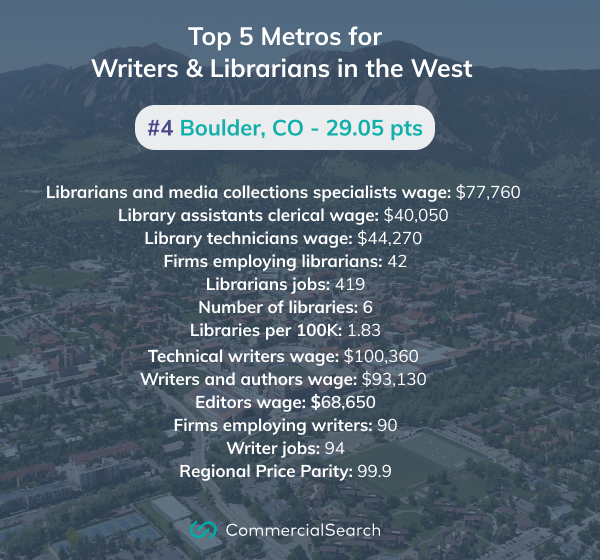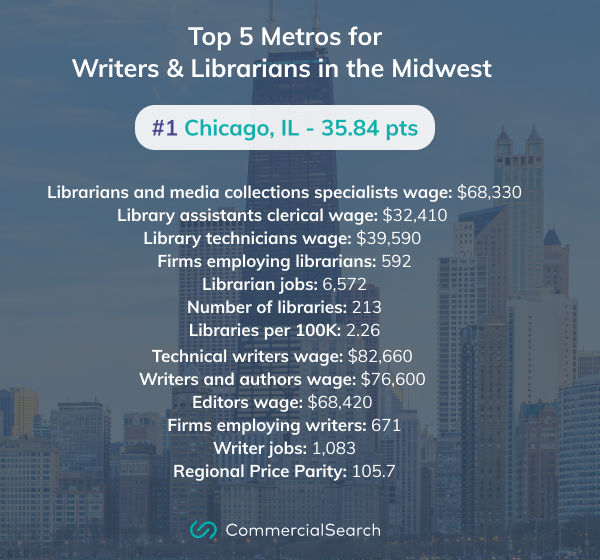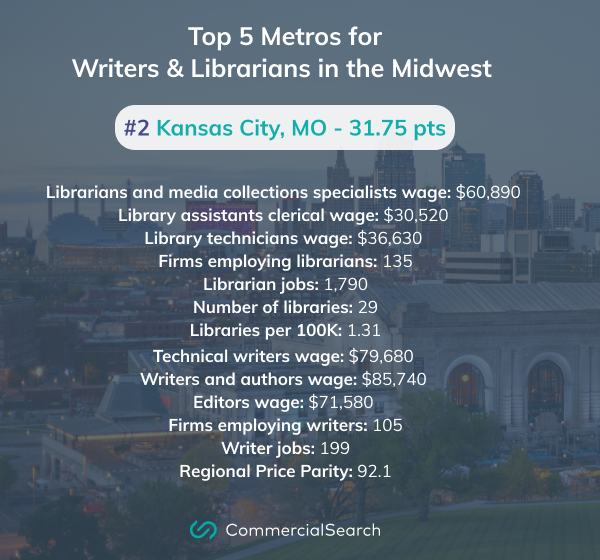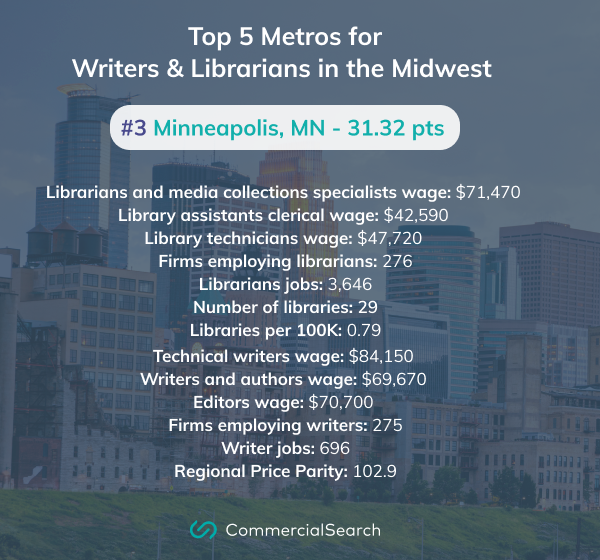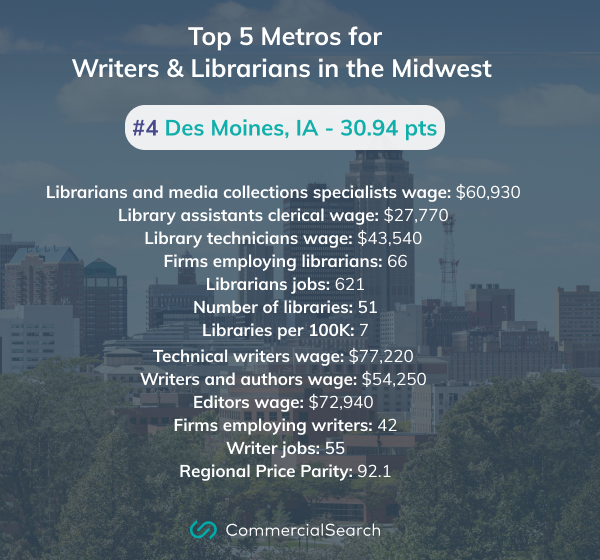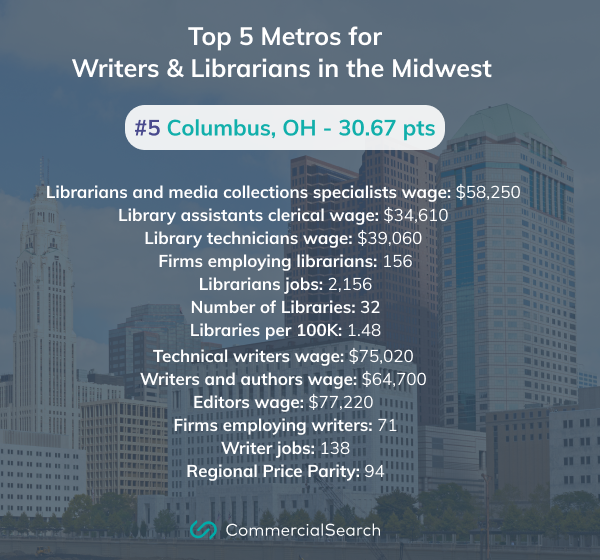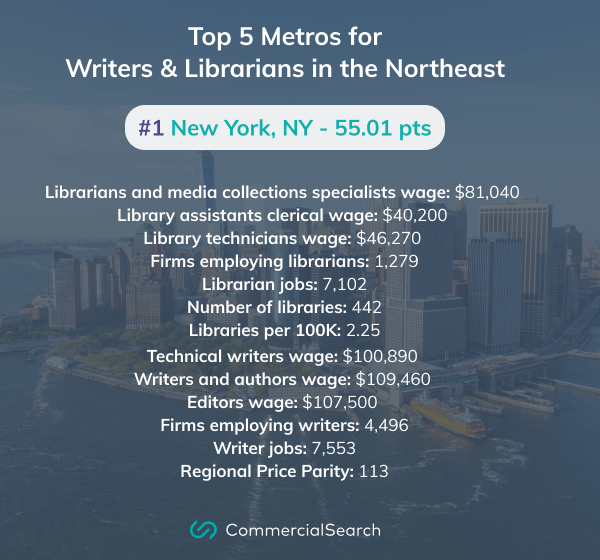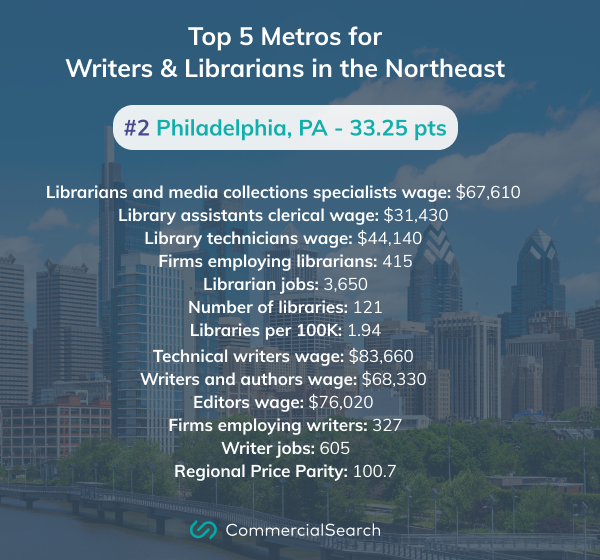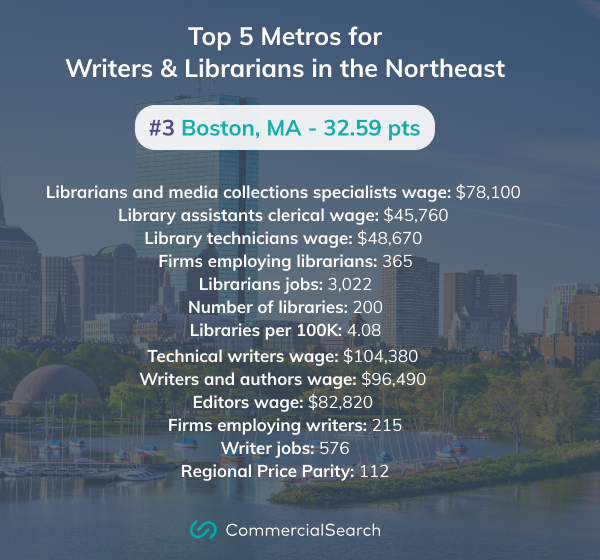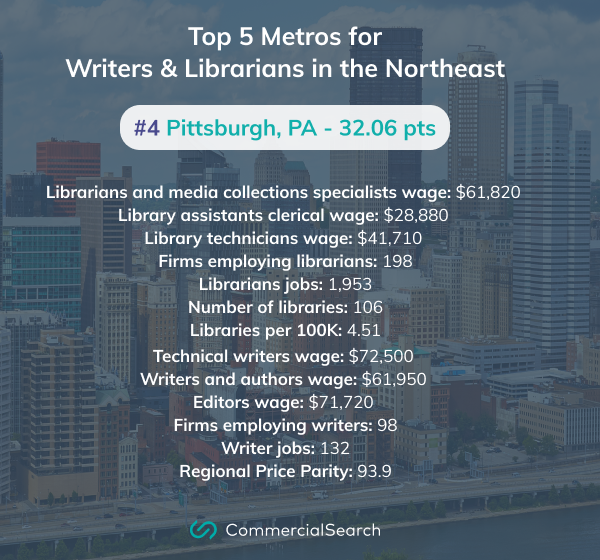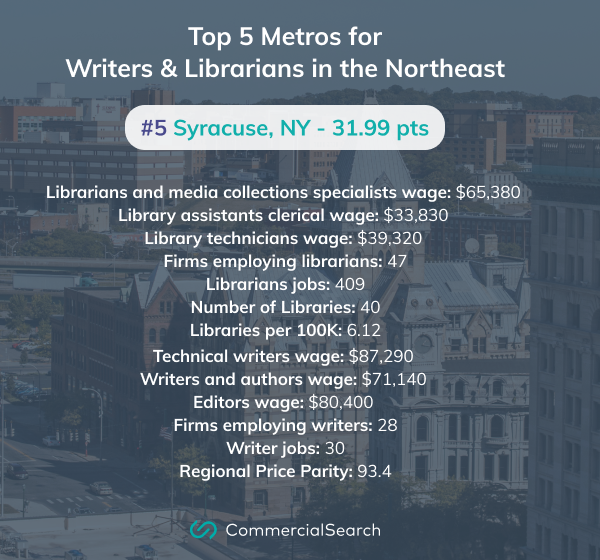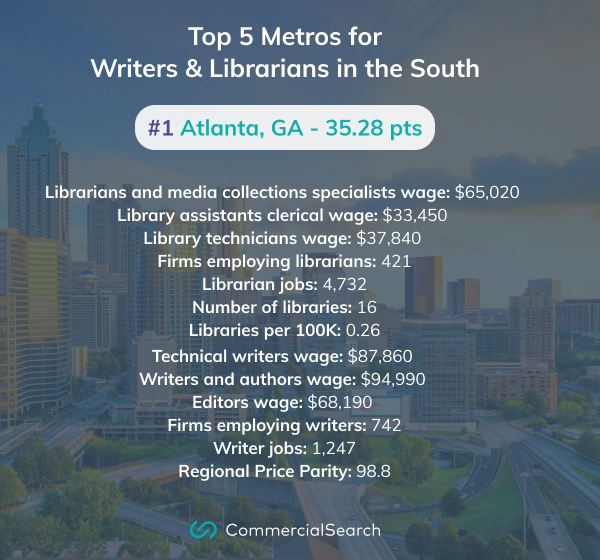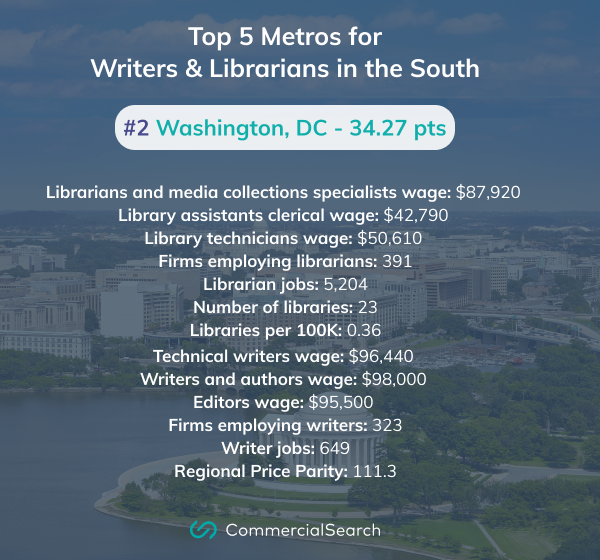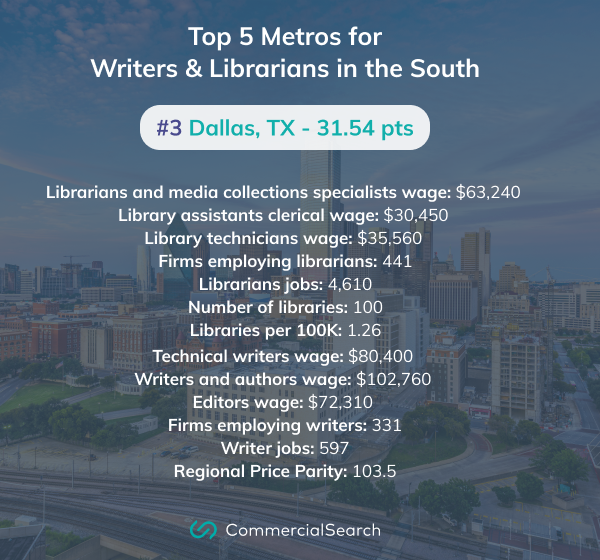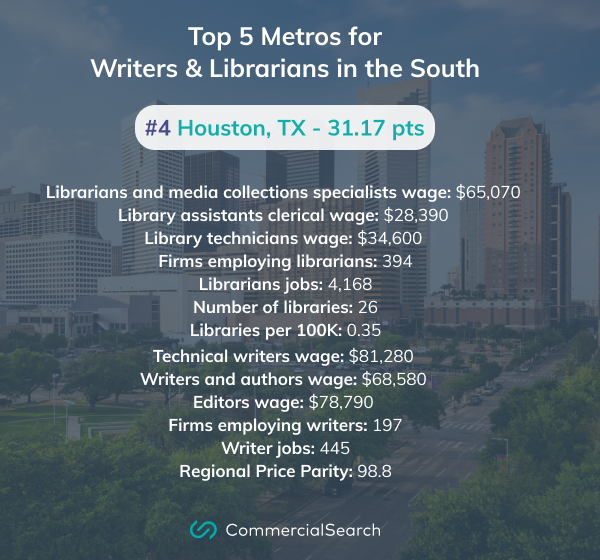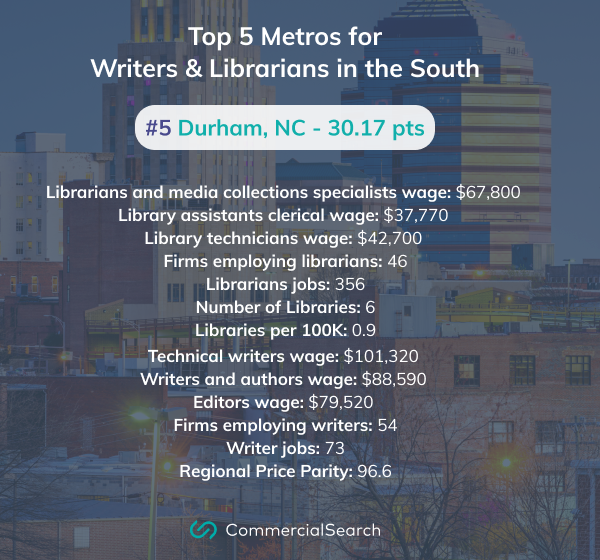During the last couple of decades, what constitutes “the place to be” for people working within a certain industry has changed quite a bit. To that end, although cities such as Los Angeles and New York continue to loom large in the imagination of aspiring writers and editors, many cities across the country have made efforts to become attractive destinations for creatives.
Of course, there are those elusive, unquantifiable reasons that bring people to a given place — the “X” factor of urban attraction, if you will. But, employment prospects and income continue to play a huge role in decisions about where to live and work, even for creative professionals — such as writers or editors — or those whose work is deeply tied to the community they’re serving, as is the case with various librarian professions.
Hence, we used Census, Bureau of Labor Statistics, and Institute of Museum and Library Services data to map 20 of the best places for professionals employed in various types of writing, editing or library service-related jobs. Specifically, we scored U.S. metropolitan statistical areas (MSAs) according to indicators such as cost of living, employment opportunities, and average wages for professionals pertaining to the writing, editing or librarian professions.
Keep reading for more details about the 20 most attractive metro areas for these professionals, along with a regional breakdown and personal insights from writers and librarians from across the West, Midwest, Northeast, and South.
Coastal Dominance: Los Angeles & New York Lead Top 20
Naturally, Los Angeles and New York stand out not only in terms of their point-tally compared to the other contenders in the top 20, but also through their dominant performances across the selected metrics.
More precisely, the two metros provide not only the best hiring and career development opportunities for writers, editors and librarians, but also the most lucrative wages for the writers. Otherwise, for librarians, it was Seattle — which ranked 10th overall — and Washington, D.C. that provided the most generous annual salaries.
Even so, the Midwest has a strong presence in the ranking with no fewer than seven entries — although, with the exception of Chicago, most of them appear in the bottom half of the list.
Speaking of Chicago, the Windy City’s third-place finish was the result of consistently above-average performances, rather than any standout scores for the indicators included in the study. Its highest-ranking metric was for the employment opportunities for library professions: With some 6,572 jobs at the metro level, Chicago landed in third place for this metric. It also managed to finish in fourth place for the number of jobs for writers and editors.
Next, the highest-ranking metro area from the South, Atlanta, ended up in fourth place — just a fraction of a point behind Chicago. Throughout the years, the area has attracted both established film studios and production companies, as well as independent creators who are turning the Southern metro into a hotspot for various writers and editors. In fact, Atlanta had the third-highest number of employment opportunities for writers and editors, behind only Los Angeles and New York.
Closing out the top five and home to several vital knowledge depositories, Washington, D.C. is a prime destination for variously skilled librarians. Here, the nation’s capital offers the second-most generous wages and ranks fourth for current employment numbers for this occupation.
Then, in seventh place, Boston managed top-five finishes for several key indicators. For instance, it boasts the third-highest wages for librarians, as well as the fifth-most attractive salaries for writers and editors. The New England metro also came in third for our library index, which looked at both the total number of libraries within the region, as well the ratio of libraries per 100,000 residents.
At the halfway mark in 10th place, Seattle gathered points for having the most well-paid librarian jobs within the list. Furthermore, its writers and editors can expect the third-highest compensation for their work, following only Los Angeles and New York.
Los Angeles Leads in West – Seattle Second-Best Choice for Writing & Librarian Jobs
Notably, no other regional ranking features such a pronounced gap between its leading entry and the rest of the contenders as the West. Of course, that’s hardly surprising given the role of Hollywood in creating career opportunities for people with various writing, editing, and even filing and media management skills. However, it’s worth putting some numbers to these differences.
Right off the bat, we notice runners-up Seattle and Las Vegas amassed significantly lower totals than Los Angeles with a 30-point gap between first and second places. When we look at the employment metrics for which the three entries compete, the Seattle metro area has roughly 4,000 librarians, compared to Los Angeles’ 7,300. At the same time, Las Vegas had 1,000 people employed in these professions.
Meanwhile, the difference is much starker when we look at writing and editing jobs with the City of Angels boasting nearly 17,000 employees in these fields, while Las Vegas and Seattle currently have 534 and 490 such professionals, respectively, working within their metro areas.
Yet, despite Los Angeles’ dominance across the regional ranking, Seattle did outrank it and all of the other California entries in terms of average wages for various librarian professions ($94,220 per year for media collection specialists; $41,000 for library assistants; and $57,000 for library technicians).
What’s more, Emerald City writers and editors also receive the second-highest pay within the Western top five. More precisely, technical writers are the most generously remunerated with average annual wages at an estimated $107,000, while editors can earn up to $96,000 per year.
Finally, Las Vegas; Reno, Nev.; and Boulder, Colo., topped the list in terms of regional price parity with the cost of living in these places hovering just below the national average.
While employment prospects and financial considerations always play an important role, the ability to conduct certain jobs remotely — especially for various types of writers — has opened up new options for those who want to get away from large urban centers.
Working as a senior editor in Lynnwood, Wash., just north of Seattle, Pavel Buev thinks his current location is the key to his wellbeing and productivity as a professional:
“Remote work allows you to fully enjoy life in this place. The ocean is not far away, where I go with my dog named Wilson. He loves to run along the water’s edge while I sit in a cafe and work. There are also many places with magnificent nature and mountain lakes nearby. My wife and I often go there, either fishing or picking mushrooms. “
Enjoying the outdoors and staying close to family and loved ones also weigh heavily when it comes to deciding on a location. Aaron Wertheimer, a copywriting specialist based in Irvine, Calif., had this to say about the benefits of living and working in southern California:
“I can take a day trip to the mountains, meditate, and journal on the beach, and even find my way into canyoneering for inspiration for my writing endeavors. And I enjoy helping out mom-and-pop B2B and B2C businesses, trades, healthcare, and other service-oriented industries because they need just as much support as those in the entertainment industry in publicizing their offerings to the world.”
Minneapolis & Kansas City Offer Most Generous Wages to Writers in Midwest
From Kyle Minor to Roxane Gay, Jac Jemc or Matt Bell, the Midwest is home to some of the nation’s finest contemporary authors and has featured heavily in our nationwide ranking for writers and librarians.
Zooming in on the region, we get a more detailed picture of these entries’ strong points. For instance, living costs in Kansas City, Mo.; Des Moines, Iowa; and Columbus, Ohio, are between 6% and 8% lower than the national average.
Somewhat surprisingly, Chicago missed out on the top spot for both wage-related metrics. It was outranked by Kansas City, Mo. — which averaged annual salaries of $85,740 for writers and authors — and Minneapolis, which provided the highest earnings for technical writers in the region at $84,000.
However, looking at the employment indicators puts Chicago firmly back in the driving seat: With approximately 6,600 jobs for librarians and 1,000 for writers and editors, Chicago provides nearly double the number of opportunities as runner-up Kansas City. Put together, these two metros are the focal point for those seeking employment in these professions in the Midwest.
Finally, Des Moines, Iowa, had the highest score among the top five Midwestern entries in the library index. Naturally, Chicago leads by sheer numbers in this regard (213 to the Iowa capital’s 51), but Des Moines boasts a superior ratio of libraries per 100,000 residents.
Boston Tops Northeastern Ranking for Librarian Wages, New York Undisputed #1 for Career Opportunities
Across the Northeast, New York predictably tops all but a few of the metrics in our ranking. One was for highest wages for librarian jobs — for which Boston outranks the Big Apple — and the other for its steep cost of living.
In any case, librarians and media collections specialists employed within the New York metro area can earn up to $81,000 per year, while technicians and assistants earn a much more modest $46,300, and $40,000, respectively.
By comparison, their colleagues in Boston can expect average annual salaries of up to $78,000 for media collections specialists, along with much more substantial remuneration for those specializing as library technicians ($49,000) and assistants ($46,000).
Still, New York offers the most competitive wages for writers ($109,500 per year) and editors ($107,500). That said, Boston is a strong contender with its most generous salaries going to its technical writers, who can expect to be paid up to $104,000 per year.
Brian David Crane, who has been working for several years as an editor and content writer in Massachusetts, had this to say about the lure of New England for professionals in his field:
“Massachusetts has a great job market, a vibrant start-up scene, quality healthcare, and living standards that are very comfortable, though not so cheap on the pockets. The state’s economy is strong, and the high-tech industry is booming, which also means that job opportunities are promising here. It is an excellent hub for higher education, and especially in my domain of content writing, PR, and content management.”
Crane also stressed the importance of hybrid work arrangements for creatives as key to obtaining a better work/life balance and improved time and resource management.
Naturally, there’s a significant employment opportunity gap between New York and the other metros: More precisely, there are approximately 7,500 writers and editors working in New York, which is more than six times the number of jobs available across all of the other four Northeastern entries combined. Then, when it comes to librarians, the difference is less stark, but still puts New York at an advantage in terms of attracting talent. That’s because, despite the high cost of living, the City That Never Sleeps boasts nearly twice as many librarian jobs as runner-up Philadelphia.
Finally, Syracuse, N.Y., and Pittsburgh are the most affordable places to live and work in the Northeastern top five with costs of living roughly 6% to 7% below the national average.
Atlanta Lures Writers to South with Great Job Prospects: Washington, D.C. Wins on Wages
Dubbed the Hollywood of the South, Atlanta is a great place for writers and authors looking for an alternative to the two coastal powerhouses of New York and Los Angeles.
With more than 1,200 writers and editors currently employed, A-town provides roughly twice as many job opportunities for talent in this field as Washington, D.C. or Dallas — the two other major employers in the region. Additionally, Atlanta’s relative affordability also bolstered its position within the Southern top five as the Georgia metro came second in terms of cost of living (behind Durham, N.C.).
But, even as Atlanta ended up with the highest score in the Southern top five, it was Washington, D.C. that managed a string of first-place performances across individual metrics.
First, the nation’s capital leads the regional ranking in terms of wages for librarians, writers and editors, despite certain entries providing higher remuneration for specific specializations within these fields. For instance, writers in Dallas can earn up to $4,000 more per year than their colleagues in Washington, D.C., whereas technical writers in Durham, N.C., might be looking at an extra $5,000 compared to similar professionals employed in the capital.
Furthermore, library and media collection specialists in Washington, D.C. can expect to make approximately $88,000 annually — significantly more than the next-best Southern entry for this metric (Durham, N.C., at $67,000).
Second, Washington, D.C. tops the Southern top five for employment opportunities for various librarian specialists. With some 5,200 people working in various librarian specializations, the capital outranks both Atlanta and Dallas by roughly 500 and 600 jobs, respectively.
Lastly, Dallas managed to secure the top spot for the study’s library index by boasting the highest ratio of libraries to 100,000 residents among the South’s top five entries.
However, even outside of the top five, Southern metros have a lot to offer to various librarian professionals, as Austinite Content Manager Tom Desmond explained:
“The city’s vibrant cultural scene and its emphasis on community engagement resonated with my personal and professional values. Austin’s diverse population and the value it places on education and public services create a dynamic environment for a librarian. The city’s libraries are seen as crucial community centers, offering a range of programs and services that go beyond traditional library functions. This community-focused approach provides a fulfilling work environment where I can make a real impact. Moreover, Austin’s commitment to innovation and technology aligns with my interest in digital librarianship and the evolving role of libraries in the digital age. The city’s support for professional development and continuous learning opportunities allows me to grow and evolve in my role. Finally, the lifestyle in Austin, with its blend of urban and natural amenities, offers a quality of life that complements my career choice, making it an ideal place to live and work.”


